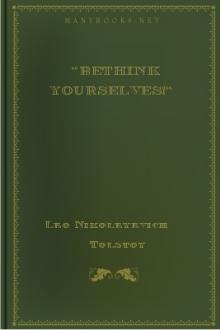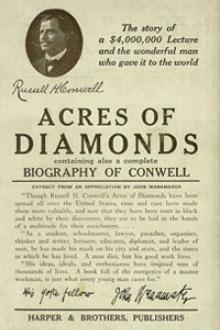Genre Essay. Page - 8

ill at first be astonished at your question. He is a soldier, he has taken the oath, and it is his duty to fulfil the orders of his commanders. If you tell him that war--i.e. the slaughter of men--does not conform to the command, "Thou shalt not kill," he will say: "And how if ours are attacked--For the King--For the Orthodox faith?" (One of them said in answer to my question: "And how if he attacks that which is sacred?" "What do you mean?" I asked. "Why," said he, "the banner.") And if you endeavor to explain to such a soldier that God's Commandment is more important not only than the banner but than anything else in the world, he will become silent, or he will get angry and report you to the authorities.
Ask an officer, a general, why he goes to the war. He will tell you that he is a military man, and that the military are indispensable for the defence of the fatherland. As to murder not conforming to the spirit of the Christian law, this does not trouble him, as either he does not believe

hem all into the lions' den.
"And the lions had the mastery of them, and brake all their bones in pieces, or ever they came at the bottom of the pit."
What had the wives and little children done? How had they offended King Darius, the believer in Jehovah? Who protected Daniel? Jehovah! Who failed to protect the innocent wives and children? Jehovah!
THE STORY OF JOSEPH.
Pharaoh had a dream, and this dream was interpreted by Joseph.
According to this interpretation there was to be in Egypt seven years of plenty, followed by seven years of famine. Joseph advised Pharaoh to buy all the surplus of the seven plentiful years and store it up against the years of famine.
Pharaoh appointed Joseph as his minister or agent, and ordered him to buy the grain of the plentiful years.
Then came the famine. The people came to the king for help. He told them to go to Joseph and do as he said.
Joseph sold corn to the Egyptians until all their money was gone -- until he had

of tobacco, let us try it." They take a match and light it, and then puff away. "We will learn to smoke; do you like it Johnny?" That lad dolefully replies: "Not very much; it tastes bitter;" by and by he grows pale, but he persists and he soon offers up a sacrifice on the altar of fashion; but the boys stick to it and persevere until at last they conquer their natural appetites and become the victims of acquired tastes.
I speak "by the book," for I have noticed its effects on myself, having gone so far as to smoke ten or fifteen cigars a day; although I have not used the weed during the last fourteen years, and never shall again. The more a man smokes, the more he craves smoking; the last cigar smoked simply excites the desire for another, and so on incessantly.
Take the tobacco-chewer. In the morning, when he gets up, he puts a quid in his mouth and keeps it there all day, never taking it out except to exchange it for a fresh one, or when he is going to eat; oh! yes, at intervals during the da

calling. He was working as atailor's apprentice near Bonchurch, in the Isle of Wight, when thenews flew through the village that a squadron of men-of-war wassailing off the island. He sprang from the shopboard, and ran downwith his comrades to the beach, to gaze upon the glorious sight.The boy was suddenly inflamed with the ambition to be a sailor; andspringing into a boat, he rowed off to the squadron, gained theadmiral's ship, and was accepted as a volunteer. Years after, hereturned to his native village full of honours, and dined off baconand eggs in the cottage where he had worked as an apprentice. Butthe greatest tailor of all is unquestionably Andrew Johnson, thepresent President of the United States--a man of extraordinaryforce of character and vigour of intellect. In his great speech atWashington, when describing himself as having begun his politicalcareer as an alderman, and run through all the branches of thelegislature, a voice in the crowd cried, "From a tailor up." Itwas ch

ly little bows and little arrows that looked like children's playthings, but upon these tiny arrows there was a small drop of poison which would kill an elephant or a man as quickly and as surely as a Winchester rifle. Their defense was by means of poison and traps. They would steal through the darkness of the forest and, waiting in ambush, let fly their deadly arrows before they could be discovered. They dug ditches and carefully covered them over with leaves. They fixed spikes in the ground and tipped them with the most deadly poison, and then covered them. Into these ditches and on these spikes man and beast would fall or step to their death.
A lady once writing to a young man in the navy who was almost a stranger, thought "Shall I close this as anybody would, or shall I say a word for my Master?" and, lifting up her heart for a moment, she wrote, telling him that his constant change of scene and place was an apt illustration of the word, "Here we have no continuing city," and asked if he c

managers of big city shops once lifted the rule prescribing certain modes for their female working staffs--if they should give their women clerks a free hand in choosing their own wardrobes for store hours--well, you know how women are!
Nevertheless and to the contrary notwithstanding, I will admit while I am on this phase of my topic that there likewise is something to be said in dispraise of my own sex too. In the other--and better half of this literary double sketch-team act, my admired and talented friend, Mrs. Mary Roberts Rinehart, cites chapter and verse to prove the unaccountable vagaries of some men in the matter of dress. There she made but one mistake--a mistake of under-estimation. She mentioned specifically some men; she should have included all men.
The only imaginable reason why any rational he-biped of adult age clings to the habiliments ordained for him by the custom and the tailors of this generation, is because he is used to them. A man can stand anything once he gets used to

beneath the rose-trees; and here and there a daisy grafted on a rose-branch flowered with a luxuriance prophetic of Mr.Luther Burbank's far-off prodigies.
In the centre of this enchanted garden MadameNilsson, in white cashmere slashed with pale blue satin,a reticule dangling from a blue girdle, and large yellowbraids carefully disposed on each side of her muslinchemisette, listened with downcast eyes to M. Capoul'simpassioned wooing, and affected a guileless incomprehensionof his designs whenever, by word or glance, hepersuasively indicated the ground floor window of theneat brick villa projecting obliquely from the right wing.
"The darling!" thought Newland Archer, his glanceflitting back to the young girl with the lilies-of-the-valley. "She doesn't even guess what it's all about."And he contemplated her absorbed young face with athrill of possessorship in which pride in his own masculineinitiation was mingled with a tender reverence forher abysmal purity. "We'll read Faust together

onderful world of ours. If this internalmolten mass came bursting out and cooled veryquickly it became granite; less quickly copper,less quickly silver, less quickly gold, and, aftergold, diamonds were made.
Said the old priest, ``A diamond is a congealeddrop of sunlight.'' Now that is literally scientificallytrue, that a diamond is an actual depositof carbon from the sun. The old priest told AliHafed that if he had one diamond the size ofhis thumb he could purchase the county, and ifhe had a mine of diamonds he could place hischildren upon thrones through the influence oftheir great wealth.
Ali Hafed heard all about diamonds, how muchthey were worth, and went to his bed that nighta poor man. He had not lost anything, but hewas poor because he was discontented, anddiscontented because he feared he was poor. Hesaid, ``I want a mine of diamonds,'' and he layawake all night.
Early in the morning he sought out the priest.I know by experience that a priest is very crosswhen awake

also a higher quality of work. When you were a high school student the world expected only a high school student's accomplishments of you. Now you are a college student, however, and your intellectual responsibilities have increased. The world regards you now as a person of considerable scholastic attainment and expects more of you than before. In academic terms this means that in order to attain a grade of 95 in college you will have to work much harder than you did for that grade in high school, for here you have not only more difficult subject-matter, but also keener competition for the first place. In high school you may have been the brightest student in your class. In college, however, you encounter the brightest students from many schools. If your merits are going to stand out prominently, therefore, you must work much harder. Your work from now on must be of better quality.
Not the least of the perplexities of your life as a college student will arise from the fact that no daily schedule is ar

, if not before. It is said thatDeucalion and Pyrrha created men by throwing stones over their headsbehind them:--
Inde genus durum sumus, experiensque laborum,
Et documenta damus qua simus origine nati.
Or, as Raleigh rhymes it in his sonorous way,--
"From thence our kind hard-hearted is, enduring pain and care,Approving that our bodies of a stony nature are."
So much for a blind obedience to a blundering oracle, throwing thestones over their heads behind them, and not seeing where they fell.
Most men, even in this comparatively free country, through mereignorance and mistake, are so occupied with the factitious cares andsuperfluously coarse labors of life that its finer fruits cannot beplucked by them. Their fingers, from excessive toil, are too clumsyand tremble too much for that. Actually, the laboring man has notleisure for a true integrity day by day; he cannot afford to sustainthe manliest relations to men; his labor would be depreciated in thema